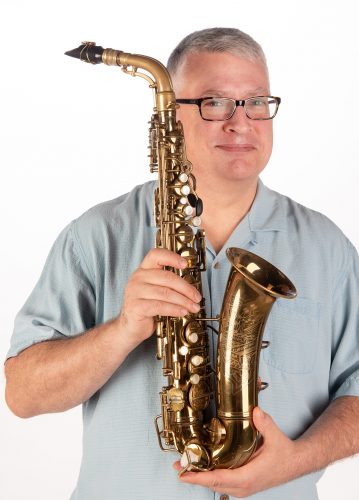
Photo by Glen E. Ellman
Jeffrey Todd Understands the Power of Words
In a Q&A, the associate professor of German and French discusses how the roots of language influence thought and explains why musicians make talented language learners.
You have graduate degrees in German and French. How does thinking and speaking in several languages influence your brain?

Jeffrey Todd, associate professor of German and French, said exposure to languages creates a greater understanding. Photo by Glen E. Ellman
It makes your brain much more flexible. Words are often metaphors or images that say something about the things to which they refer. The metaphor that one language gives for a thing is very often different from the metaphor that another language gives. For example, lebensmittelgeschäft is the German word for grocery store. It says the store is the means of life.
When you are exposed to different languages, you get used to thinking of the same things in different ways. What that means is that you understand that the way your language has come to refer to a thing is certainly not the only way to do that. You can refer to the same thing in many ways, and so you see that thing in different ways. Your language reveals it to you in a new way.
It also gives you a sense of relativity, that your own way of thinking is not an absolute, which has very important ethical consequences. If you are not trained to think that way, you might be predisposed to think your way is the only way.
How does language influence thought?
In German, you often have to wait until the end of the sentence to place the verb. There’s a kind of calculation, a planning that the language imposes upon you. Perhaps it has to do with the planning mentality of Germans, who are very, very thoughtful. They think things out, just in general. There’s so much calculation embedded in German, much more so than in English. It certainly can have an influence on mental habits. What ingrains a habit more than talking every day? It influences you constantly.
You studied at the Sorbonne in Paris. Did you notice differences in higher education in France?
Yes. You felt the history while you’re in these grand and very ancient halls of learning. And the tradition of the grand oration was still strong. In the U.S., we do a really good job of teaching things and training people. That’s very, very different from the French tradition of the grand speech. I remember one series of lectures that was given by Guy-Willy Schmeltz, who was teaching a course about the modern world. He was really getting into the various kinds of changes that the modern world has brought. It really had a sense of drama.
What are the current trends in foreign-language enrollment in higher education in the U.S.?
It’s downtrending a little bit. That’s not encouraging. Trends in German, particularly, have been trending down. Generally, languages are not being taught as much. We witness that at the high school levels, too. At TCU, I think one of the things that has been difficult is the proliferation of Bachelor of Science degrees, even in AddRan. In the Bachelor of Arts degree, you have a language requirement, but the B.S. does not.
“English is such a hodgepodge language. To understand it, you really have to understand other languages.”
Jeffrey Todd
But there are all sorts of jobs that involve language study, and they’re going unfilled because people don’t have the skills. Languages introduce you to a whole world. You can go over to a place and have everything translated for you, but it’s not the same at all. Language is the key to experiencing another culture.
Other than conversational skills and an expanded vocabulary, what do students learn by studying a foreign language?
They learn to think laterally. They learn greater flexibility. They’re not stuck in certain ways of thinking. They can draw on other perspectives that the other languages and other cultures give them.
Why would you argue that foreign language skills are an essential component of a well-rounded education?
English is such a hodgepodge language. To understand it, you really have to understand other languages. You should have some background in Latin and Greek if you want to understand the learned vocabulary of English. Even just to understand English, you need some kind of foundation, at least in terms of vocabulary roots.
One of the goals of the teaching of the liberal arts is this flexibility of mind. History and the study of language go hand in hand because history also teaches you this kind of flexibility, this understanding that over time, people have thought about things in very, very different ways. Philosophy does the same thing. So does religion.
Language is one of the central ways of teaching this flexibility. And it’s also the way in which you could best ingrain it in yourself. You can learn how to be a historian or a philosopher, but still you’re immersing yourself in a language. And in a sense, you’re allowing that language to take you over. It’s a depth of an immersion that I don’t think you can get otherwise. It’s a depth of experience that you probably don’t get in any other way. The other liberal arts disciplines are intellectual. They’re thought, but they don’t seep into your very pores in the same way that language does. They’re not the way you express emotions. Language is a way of life.
How would knowledge of a language such as German help someone in a career?
If you’re in business, don’t let anyone ever tell you that it doesn’t matter if you speak the language of the people you’re dealing with, because their attitude toward you will be totally different if you speak their language. If you learn a foreign language, you are definitely going to have a degree of respect from other people that you won’t otherwise.
You play saxophone. Do one’s linguistic habits correlate with the way that person plays an instrument?

Jeffrey Todd talks about the link between learning music and learning language. Photo by Glen E. Ellman
Music is a language. The same tones are used throughout the world. Having a musical ear helps you tremendously in learning foreign languages. If you can pick that up, that sense of logical musical structures, and combine that with the logic of language, it will help you tremendously. It’s been proven many times in my classes that music students are excellent language learners.
What is the relationship between a country’s spoken and musical languages?
My research is on the way jazz music developed in Germany, particularly in the German Democratic Republic, the former communist East Germany. The role that jazz, and particularly free jazz, played in the culture was very much of its time and place. There were free jazz concerts in the GDR that had a Woodstock feel to them. Imagine getting that many people to attend a free jazz concert in the States. It makes you laugh. It’s impossible to imagine because it has never happened.
There was a lot of surveillance, and there were a lot of restrictions on what one could do and what one couldn’t do. The jazz combined structure with freedom. It was a nice balance that these musicians achieved. In that kind of cultural and political atmosphere, it was a way of expressing the desire for spiritual freedom, and for greater political freedom as well.
Editor’s Note: The questions and answers have been edited for length and clarity.

Your comments are welcome
Comments
Related reading:
Research + Discovery
The Secret to Learning a Language
For Guangyan Chen, the absence of context means learning a language is just translating, not participating.
Alumni
A Mood in Jazz
On stage or in class, Joey Carter fills the room with melodies and rhythm.
Research + Discovery
Mayan Poets, Storytellers Share their Ancient Language
A new book, translated by a TCU professor, highlights contemporary Mayan poets and storytellers.